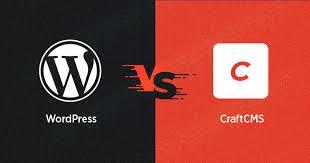Choosing the right content management system (CMS) is crucial for building a successful, scalable, and user-friendly website. Two of the most popular options today are WordPress and Craft CMS. While both offer robust features, they cater to different user types and project goals.
In this post, we will break down five key differences between WordPress and Craft CMS, helping you make an informed decision based on performance, flexibility, ease of use, security, and development workflow.
1. Popularity and Community Support
WordPress is the most widely used CMS globally, powering over 40% of all websites. Its massive community ensures there is no shortage of plugins, themes, forums, and tutorials. Beginners often find WordPress easier to adopt because of its large ecosystem.
Craft CMS, in contrast, is a more niche platform tailored toward developers and custom web projects. While its community is smaller, it is highly engaged and supported by comprehensive documentation and a dedicated support team.
Verdict:
Choose WordPress if you want a large community and plug-and-play options. Choose Craft CMS if you prioritize structured development and personalized support.
2. Flexibility and Customization
WordPress offers thousands of pre-built themes and plugins, making it ideal for users who want to launch a website quickly. However, customizing beyond the available templates often requires third-party plugins or significant theme modifications, which can introduce performance and security issues.
Craft CMS is built with customization in mind. It gives developers complete control over the structure and design. Unlike WordPress, which comes with predefined content types, Craft allows you to define your own fields and relationships, making it ideal for complex websites and custom applications.
Verdict:
If you’re looking for true creative freedom and a tailored content architecture, Craft CMS wins in flexibility.
3. Content Management Experience
WordPress offers a user-friendly dashboard with a classic WYSIWYG editor and, more recently, the Gutenberg block editor. It’s generally easy to use for content creators and non-technical users.
Craft CMS features a clean, intuitive control panel that focuses purely on content. Its Matrix field and section-based structure make it powerful for managing varied content types. However, it may require an initial learning curve for users unfamiliar with structured content systems.
Verdict:
WordPress is ideal for users who want simplicity and speed. Craft CMS provides a more powerful experience for teams needing a highly structured content model.
4. Security and Performance
Because of its popularity and open ecosystem, WordPress is a frequent target for security threats. While it can be secured with proper maintenance and trusted plugins, its large plugin base increases the risk of vulnerabilities.
Craft CMS is less targeted due to its smaller footprint and developer-first approach. It also relies less on third-party plugins, reducing potential security holes. In terms of performance, Craft sites often load faster due to cleaner architecture and more efficient asset management.
Verdict:
Craft CMS takes the lead in security and performance for complex, custom-built websites, while WordPress requires careful management to maintain similar standards.
5. Developer Workflow and Scalability
WordPress was originally built as a blogging platform, and its file-based templating system reflects that. While it has evolved significantly, large-scale or enterprise-level projects often struggle with performance issues unless carefully optimized.
Craft CMS is a modern CMS built from the ground up for developers. It integrates smoothly with development workflows such as Git, Composer, and modern front-end tools. It also allows for seamless scalability, making it suitable for content-heavy websites or applications with advanced features.
Verdict:
Craft CMS is the better choice for teams that rely on modern development practices and plan to scale the site over time.
Conclusion
Both WordPress and Craft CMS are powerful platforms, but the best choice depends on your project's needs.
Choose WordPress if you need quick deployment, community support, and a large ecosystem.
Choose Craft CMS if you require a scalable, developer-friendly platform with flexible content modeling.
Each CMS has its strengths. WordPress is the go-to for simple websites, blogs, and small businesses. Craft CMS is ideal for custom-built websites, agencies, and enterprises that need total control over structure and performance.
